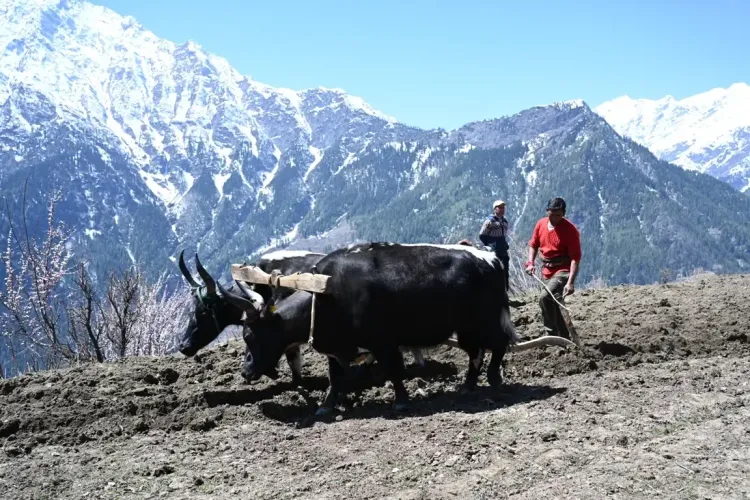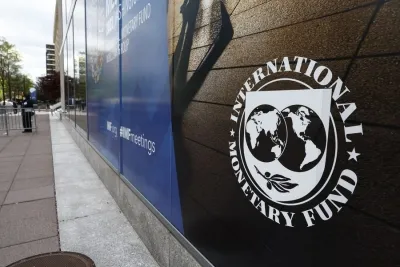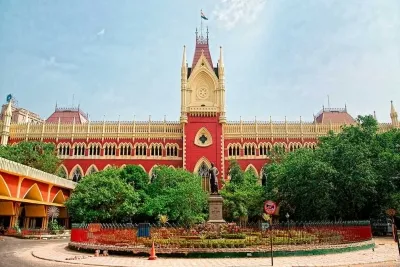Farmers in Himachal Embrace Cow Dung and Buttermilk for Eco-Friendly Agriculture

Synopsis
Key Takeaways
- Indigenous cow dung is rich in microorganisms.
- Natural farming techniques are gaining popularity.
- Community is optimistic about economic growth.
- Government supports natural farming initiatives.
- Over 2,100 farmers have been trained.
Shimla, April 26 (NationPress) The dung of indigenous cows, which is reported to contain 300 to 500 times more beneficial microorganisms than that of other livestock, along with homemade solutions like sour buttermilk sprays, are being favored for natural farming in the rugged Pangi Valley of Himachal Pradesh’s Chamba district, located in the scenic Pir Panjal range. Here, traditional farming methods are upheld to maintain a sustainable ecosystem.
Around 25,000 individuals living in 19 panchayats within the Pangi Valley, which experiences extreme climate conditions, heavily rely on agriculture and horticulture for their survival. Traditional farming techniques often leave crops vulnerable to diseases.
Nevertheless, the shift towards natural farming practices not only provides enhanced protection against environmental threats but also boosts crop yield, leading to larger incomes, as stated by the government on Saturday.
The community, residing alongside the Chandrabhaga river, is thrilled about the declaration of making Pangi the state’s pioneering natural farming sub-division. While traditional farming has been the norm in Pangi for generations, the move towards natural farming techniques is anticipated to greatly improve the economic well-being of local farmers and orchardists, according to government insights.
This landmark declaration was made by Chief Minister Sukhvinder Sukhu earlier this month, prompting the district administration to hasten the implementation of this initiative.
In response to the government’s initiative, farmer Ratto Devi from Bhatwas village, who adopted natural farming two years ago, shared that their ancestors also avoided chemical use in agriculture and continue to refrain from synthetic fertilizers and pesticides.
She noted that the application of ‘ghanjivamrit’ (a natural bio-enhancer) has drastically increased crop yields.
Similarly, another farmer, Savitri Devi of Punto village, mentioned that all necessary inputs for natural farming are easily obtainable at home. Preparations such as ‘ghanjivamrit’ and ‘jivamrit’ are utilized to improve soil fertility and enhance crop productivity.
A fundamental element of natural farming is the indigenous Indian cow. To defend crops from fungal diseases and pests, natural mixtures like sour buttermilk sprays, ‘kannai astra’, and ‘agni astra’ are being employed.
She hopes that the formation of the natural farming subdivision by the government will not only advance natural farming throughout the valley but also significantly increase the earnings of farmers and orchardists.
Since the establishment of the current government in 2022, several initiatives have been launched to foster natural farming in the Pangi Valley.
At present, natural farming is being practiced on around 400 hectares, with over 2,100 farmers trained in this agricultural methodology.
Block Training Manager Pali noted that chemical farming has historically never been a practice in the region.
Currently, 90 percent of the cultivated land is allocated to agriculture, while the remaining 10 percent is dedicated to horticultural pursuits. Thanks to government efforts, a Farmer Producer Organisation (FPO) consisting of natural farming practitioners has been formed.
Through this FPO, apples are being sold at Rs 75 per kg, and farmers are receiving fair compensation for crops like kidney beans (rajmah), potatoes, and peas. Experts believe that the establishment of the natural farming subdivision will further benefit the region’s farmers.
During the state-level Himachal Day celebrations in Pangi this month, the Chief Minister announced a support price of Rs 60 per kg for barley crops cultivated through natural farming techniques.










